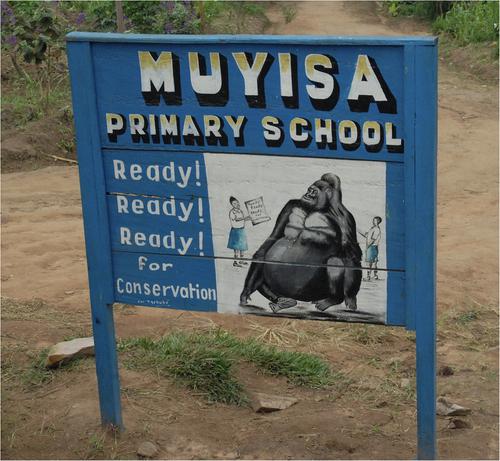当前位置:
X-MOL 学术
›
Am. J. Primatol.
›
论文详情
Our official English website, www.x-mol.net, welcomes your
feedback! (Note: you will need to create a separate account there.)
Human engagement and great ape conservation in Africa
American Journal of Primatology ( IF 2.0 ) Pub Date : 2020-11-10 , DOI: 10.1002/ajp.23216 Tammie Bettinger 1 , Debby Cox 2 , Chris Kuhar 3 , Katherine Leighty 4
American Journal of Primatology ( IF 2.0 ) Pub Date : 2020-11-10 , DOI: 10.1002/ajp.23216 Tammie Bettinger 1 , Debby Cox 2 , Chris Kuhar 3 , Katherine Leighty 4
Affiliation

|
Despite large investments of funding into great ape conservation in Africa, wild populations of gorillas (Gorilla ssp), chimpanzees (Pan troglodytes ssp) and bonobos (Pan paniscus) continue to decline. Causes for this decline fall into three broad categories: habitat loss, illegal hunting, and disease. Contributing factors to all of these causes are linked to pressure from the expanding human population competing for forest resources. We have moved beyond the time of debating the pros and cons of including human engagement activities in conservation. If humans are part of the problem, they must also be part of the solution. To move our understanding of which human engagement activities are effective, what methodologies are being used and best practices for setting up a successful framework, we interviewed practitioners representing 53 projects working in great ape habitat in Africa. The interviewees represented almost 900 years of experience with African great ape conservation. We found that all practitioners agreed that for conservation to succeed, projects must engage with humans utilizing resources from great ape habitats. However, evaluation of such work was elusive. Projects that employed at least one person designated as an educator were more likely to have structured programs, regular engagement activities, and to evaluate their work. To date, little information on the success or failure of the activities has been published, thus perpetuating the problem of relying on personal experience rather than evidence when developing new engagement programs. Additionally, linking human engagement activities to biological impact remains a challenge. The results presented in this paper demonstrate the importance placed on human engagement activities to effectively conserve great apes in Africa while at the same time identifies gaps in our understanding on the link between such activities and project success.
中文翻译:

非洲的人类参与和类人猿保护
尽管在非洲的类人猿保护方面投入了大量资金,但大猩猩 ( Gorilla ssp)、黑猩猩 ( Pan troglodytes ssp) 和倭黑猩猩 ( Pan paniscus ) 的野生种群) 继续下降。这种下降的原因分为三大类:栖息地丧失、非法狩猎和疾病。所有这些原因的促成因素都与不断扩大的人口争夺森林资源的压力有关。我们已经超越了辩论将人类参与活动纳入保护的利弊的时间。如果人类是问题的一部分,那么他们也必须是解决方案的一部分。为了加深我们对哪些人类参与活动有效、正在使用哪些方法以及建立成功框架的最佳实践的理解,我们采访了代表在非洲类人猿栖息地工作的 53 个项目的从业者。受访者代表了近 900 年的非洲类人猿保护经验。我们发现所有从业者都同意,要使保护取得成功,项目必须与人类合作,利用类人猿栖息地的资源。然而,对此类工作的评估是难以捉摸的。雇用至少一名被指定为教育工作者的项目更有可能有结构化的计划、定期参与活动并评估他们的工作。迄今为止,关于活动成败的信息几乎没有公布,因此在开发新的参与计划时依赖个人经验而不是证据的问题长期存在。此外,将人类参与活动与生物影响联系起来仍然是一个挑战。
更新日期:2020-11-12
中文翻译:

非洲的人类参与和类人猿保护
尽管在非洲的类人猿保护方面投入了大量资金,但大猩猩 ( Gorilla ssp)、黑猩猩 ( Pan troglodytes ssp) 和倭黑猩猩 ( Pan paniscus ) 的野生种群) 继续下降。这种下降的原因分为三大类:栖息地丧失、非法狩猎和疾病。所有这些原因的促成因素都与不断扩大的人口争夺森林资源的压力有关。我们已经超越了辩论将人类参与活动纳入保护的利弊的时间。如果人类是问题的一部分,那么他们也必须是解决方案的一部分。为了加深我们对哪些人类参与活动有效、正在使用哪些方法以及建立成功框架的最佳实践的理解,我们采访了代表在非洲类人猿栖息地工作的 53 个项目的从业者。受访者代表了近 900 年的非洲类人猿保护经验。我们发现所有从业者都同意,要使保护取得成功,项目必须与人类合作,利用类人猿栖息地的资源。然而,对此类工作的评估是难以捉摸的。雇用至少一名被指定为教育工作者的项目更有可能有结构化的计划、定期参与活动并评估他们的工作。迄今为止,关于活动成败的信息几乎没有公布,因此在开发新的参与计划时依赖个人经验而不是证据的问题长期存在。此外,将人类参与活动与生物影响联系起来仍然是一个挑战。









































 京公网安备 11010802027423号
京公网安备 11010802027423号